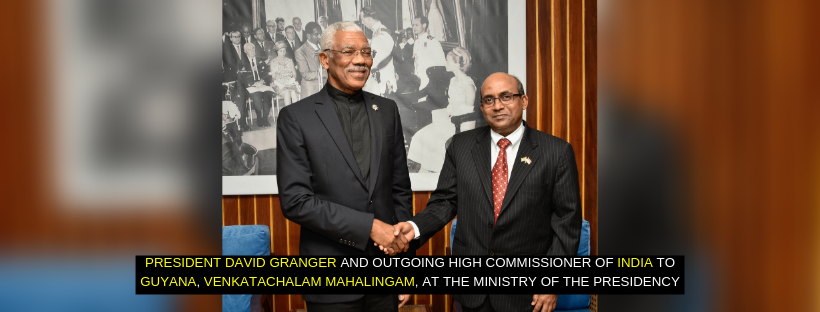It was through deliberate collaboration between Guyana and India that the Indian Immigration Monument was unveiled at Palmyra, East Berbice-Corentyne (Region Six) earlier this year. This was underscored by President David Granger who made it clear that he is grateful to India for its contribution and collaboration on the project which, he said, symbolises the ties of history between the two nations.
The President’s disclosure came even as he received a courtesy call from outgoing Indian High Commissioner to Guyana, Mr Venkatachalam Mahalingam at the Ministry of the Presidency.
President Granger thanked High Commissioner Mahalingam for the support he provided to Guyana during his five-year tenure.
“I am very glad you were here for the unveiling of the monument. I think of it as a legacy for your tenure here. It is a concrete symbol of the friendship between the two countries,” the President said.
Additionally, President Granger said the Indian High Commissioner’s presence in Guyana also aided in fostering social cohesion through the hosting of various cultural events, which not only saw the participation of descendants of East Indians but all ethnic groups in the country.
“You brought a particular quality to your office. Your style made citizens feel comfortable and that is the way it should be. We are gradually breaking the barriers and becoming more cohesive,” the President said, while reminding that annually he hosts religious and cultural activities in the Baridi Benab, located in the State House compound.
“You have helped to demystify these festivals so Guyanese can participate,” President Granger added.
Meanwhile, High Commissioner Mahalingam, who was accredited in 2014, said he too was pleased with his tenure in Guyana. He disclosed that over the past five years India has seen the highest number of visits from Guyana.
“The visits far exceed previous times,” the High Commissioner said, while adding that Guyana and India have enjoyed excellent relations.
Guyana and India established diplomatic relations in 1966 based on the promotion of economic interests and the strengthening of cultural ties.













